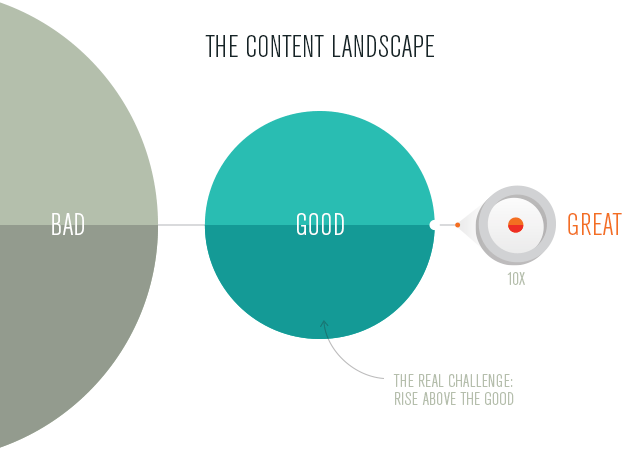Quest for Greatness
The democratization of film we’ve experienced on the web over the past decade with services like YouTube and Vimeo has put home videos side-by-side with professional content and consequently opened up the floodgates to a lot of bad films. From that ocean of awfulness, Short of the Week was born, and we’ve spent the past 5+ years searching for the greatest stories to hold up in front of the world because we’re naive enough to think it just might change your life.The Rise of Good
If you think being GREAT simply means rising above the BAD, you’re ignoring your biggest obstacle of allthe GOOD. Over the past five years, we’ve gotten really good at avoiding the BAD. So much that we don’t bother with it. We spend most of our time searching for GREATNESS among the GOOD. It is, after all, the GOOD where most filmmakers fall flat. Cat videos and bad web series are not your competition. Your real competition is the 5,000 other dramas shot with shallow depth-of-field and digital effects that go up every week. Much of the content we come across falls into this vague category that is neither terrible nor amazingit’s just GOOD. And to us, GOOD isn’t good enough.Don’t Settle for Good
Okay, so to most, GOOD and GREAT may seem like a matter of semantics. But to us, the two are worlds apart. A GOOD film has nice cinematography, a story that would make Robert McKee proud, and believable acting. In short, GOOD follows all the right rules. And that’s exactly why it’s not GREAT.- GOOD makes sense. GREAT makes you think.
- GOOD is familiar. GREAT offers a new perspective on the world.
- GOOD is timeless. GREAT is now.
- GOOD feels right. GREAT makes you feel something new.
Be Great
Today, it’s not enough to be GOOD. Only the GREAT will capture the world’s attention. The latest DSLR cameras and editing software may have made our films look better, but they haven’t made us better storytellers. So before you splurge on that new RED camera, think not just about crafting the film’s story but the larger story surrounding the film. Ask yourself what a curator may say about your filmwhy it rises above the multitude of others out there. We curators need a hooksomething new and noteworthy that can be summed up in 140 characters. It can be a twist on a familiar concept (The Employment). A compelling idea for technology that shifts our world view (Sight). A ground-breaking technique (A Family Portrait). A modern take on an old idea (Bruce). A hidden experience woven throughout the story (The Thomas Beale Cipher).Your real competition is the 5,000 other dramas shot with shallow depth-of-field and digital effects that go up every week.Weeks before my high school graduation, a great English teacher of mine dropped a bombshell assignment on us. Throughout his career he continually challenged us to think bigger, and weeks before heading out on our own, left us with the biggest question of allwhat is greatness? Now, that question falls on you.
 Andrew S Allen
Andrew S Allen
